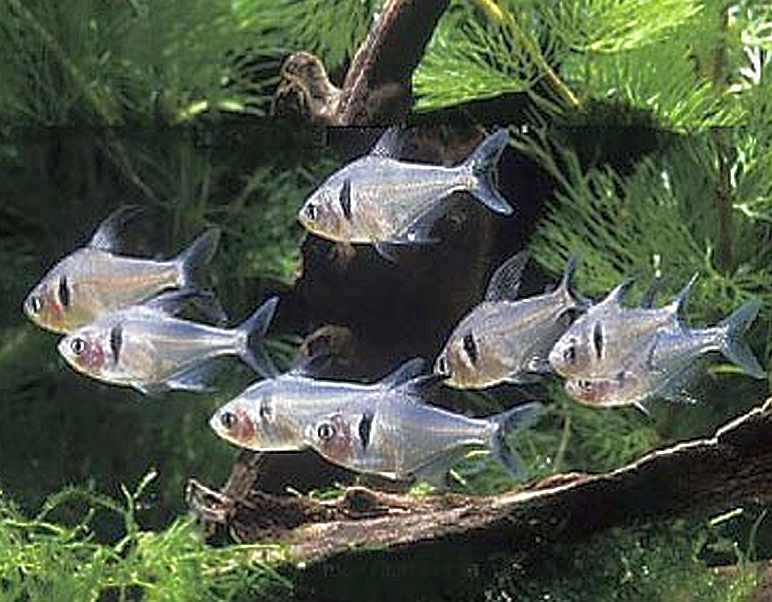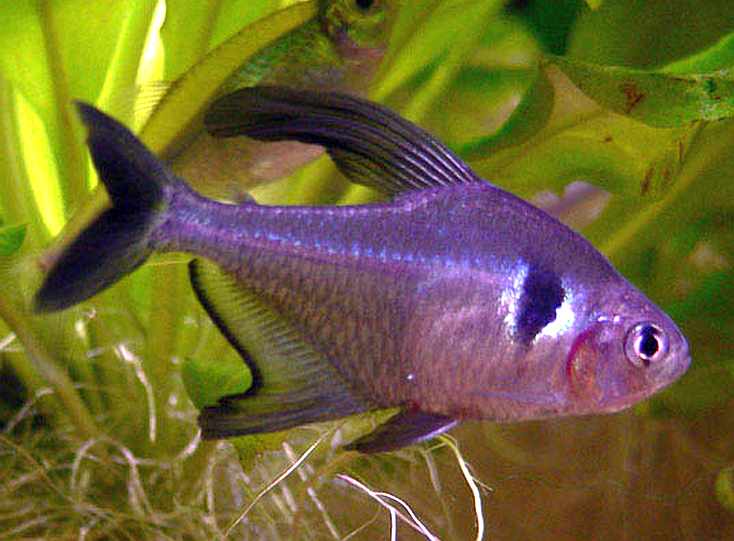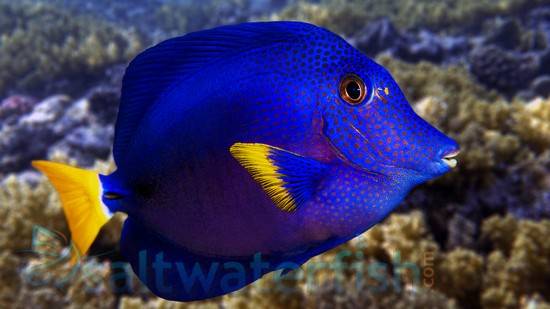The Black Phantom Tetra (Hyphessobrycon megalopterus) is found in the Paraguay, Guaporé, and Mamore river basins in Brazil and Bolivia. In the aquarium trade, it is one of the more popular tetras sold to tropical fish keeping enthusiasts and is sometimes confused with the Black Tetra (Gymnocorymbus ternetzi).
The Black Phantom Tetra has a tetragonal shaped body that is colored light grey. They have a black blotch behind their gills which is surrounded by an iridescent silver edging that is characteristic of these tetras. They also have a relatively transparent body which is how their common name (phantom) developed.
All the fins of male Black Phantom Tetras are black. The females have a black dorsal fin with reddish colored pelvic, anal, and adipose fins.
Although Black Phantom Tetras are a social, peaceful species, the males are territorial and will defend their space in the tank by presenting themselves with their dorsal and anal fins fully extended. Their dark colors become more intensified and the edging of the body patch stands out more prominently during these displays.
Unlike many of the other schooling tetras who prefer living in large shoals, Black Phantom Tetras seem to prefer living in smaller groups of 4 or 5 individuals. This makes them perfect candidates for smaller community aquariums as long as sufficient space is provided for males to stake out their territories.
Black Phantom Tetras do best in a densely planted aquarium with a sandy substrate, some rocks, driftwood or bogwood
, and a few floating plants to mimic their native environment. They should be housed in groups of 6 or more in a slightly acidic, soft water aquarium, with subdued lighting.
These tetras are egg scatterers and like other tetras will eat their eggs if they are not removed from the breeding tank after spawning.
To breed Black Phantom Tetras, place a pair that has been conditioned on live foods (daphnia, brine shrimp, microworms
) into a dimly lit breeding tank with some breeding mops or fine leaved plants, and a few floating plants. The water should be very soft and the pH should be dropped down to around 5.5.
The female will usually scatter around 300 eggs at random throughout the tank. When spawning has been completed, remove the parents or they will devour their eggs. After the eggs hatch, it will take about four or five days before the fry are free swimming. At this time feed them infusoria and baby brine shrimp for a couple of weeks until they are able to eat finely crushed flake food.
Adult Black Phantom Tetras are easy to feed and will readily accept quality flake foods, micro pellets, live or frozen daphnia, brine shrimp, bloodworms or freeze dried bloodworms
and
tubifex.
When offered for sale, Black Phantom Tetras are usually 1/2″ to 1″ in length.
Minimum Tank Size: 10 gallons
Care Level: Easy
Temperament: Peaceful
Aquarium Hardiness: Hardy
Water Conditions: 73-83° F, KH 4-8, dGH 12 – 20°N, pH 6.0-7.5
Max. Size: 2”
Color Form: Black, White
Diet: Omnivore
Compatibility: Suitable for peaceful community tanks
Origin: Central Brazil, Bolivia
Family: Characidae
Lifespan: 3-5 years
Aquarist Experience Level: Beginner




2 Responses to “Black Phantom Tetra (Hyphessobrycon megalopterus)”
Trackbacks/Pingbacks
[…] gourami, angelfish, dwarf cichlids, the smaller catfish and loaches. Like the closely related Black Phantom Tetra (Hyphessobrycon megalopterus); keeping an even ratio of males to females will provide you with a continuous display of males of […]
[…] River basins of southern Brazil, Argentina, and Bolivia. It is sometimes confused with the Black Phantom Tetra (Hyphessobrycon megalopterus) which is an entirely different […]